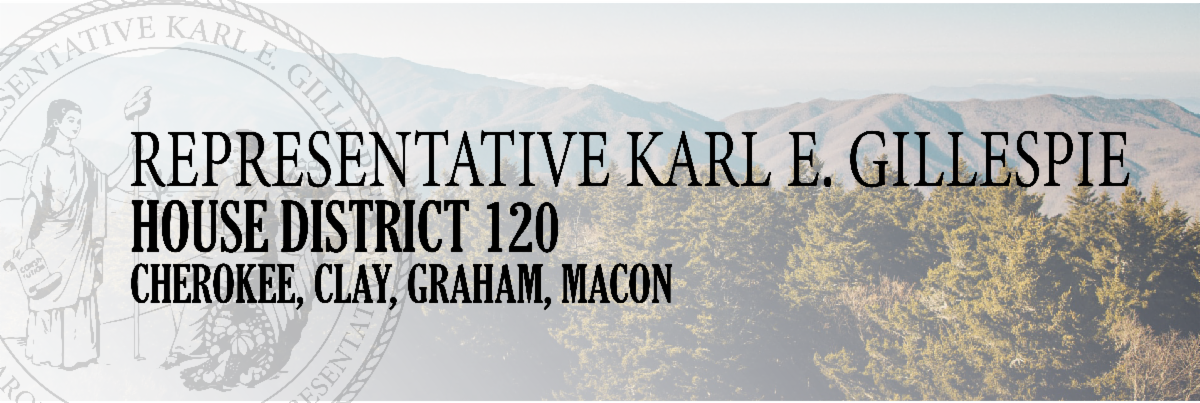
PRESS RELEASE (07-21-2022)
REPRESENTATIVE KARL GILLESPIE
Rep. Gillespie Legislative Newsletter Volume XXV
The General Assembly adjourned its legislative short session after passage of the state budget on Friday, July 1. According to the adjournment resolution, the legislature is scheduled to periodically reconvene throughout the remainder of the year. However, those sessions are expected to be nonvoting.
Until the long session begins in January 2023, The Legislative Review will focus on highlighting key aspects of North Carolina's budget and significant legislation passed during the biennium. This week's newsletter will focus on the education portion of the state budget.
There are significant increases for education funding in the budget. In addition to increases in teacher pay and support staff,, there is significant funding for literacy coaches, school lunches, and school safety
Education Funding Highlights in the 2022 State Budget
· Total $16.5 billion for education in FY 2022-23 (6.7% increase above FY 2021-22). Amounts to 59% of the entire budget.
· $581 million for school construction and capital improvements in FY 2022-23 ($1.1 billion over the biennium).
· Provides funds to cover copays for students qualifying for reduced-price lunches.
· Funds additional 124 literacy coaches and early learning specialists to aid in early literacy efforts.
· Expands funding and eligibility for Opportunity Scholarship Program to increase school choice options for low-income families.
· Creates $250,000 recurring grant for schools to purchase feminine hygiene products in schools.
School Safety Funding Highlights in the 2022 State Budget
· Adds $32 million in School Safety Grants to support students in crisis, safety training, and equipment in schools ($41.7 million total).
· Expands funding for school resource officers by at least $41 million.
· Additional $15 million for the School Resource Officer Grant program for elementary and middle schools.
· Increases state match for the School Resource Officer Grant program to $4 per every $1 for low-wealth counties.
· Increases the At-Risk allotment to reflect the current salary necessary to provide one School Resource Officer for each high school.
· $5 million for cybersecurity and bomb threat preparedness at North Carolina’s six HBCUs.
· Requires the Center for Safer Schools to gather additional data on school safety systems, policies, and procedures, and to report information and recommendations for improving school safety to the General Assembly.
Significant education funding was included in the original budget (2021 Appropriations Act), such as:
Elementary and Secondary Education
The 2021 Appropriations Act includes targeted funding increases in the Department of Public Instruction and University of North Carolina (UNC) budgets to support students in grades kindergarten through twelfth (K-12) and responds to the COVID-19 pandemic using multiple approaches, such as:
• A “hold harmless” for K-12 public school units to address enrollment decreases below anticipated FY 2021-22 Average Daily Membership (ADM).
• $35.0 million to fund the impact of additional children with disabilities and other students if actual enrollment exceeds projected levels.
• $338.7 million in federal Elementary and Secondary School Emergency Relief Fund (ESSER III) funds from the American Rescue Plan Act to multiple statewide programs, which are largely focused on addressing learning loss and the particular needs of students especially impacted by the pandemic, such as economically disadvantaged students, students with disabilities, and English language learners.
The 2021 Appropriations Act also supports other initiatives intended to benefit K-12 students.
-Creates a new funding allotment for school psychologists that will provide support for 115 new school psychologist positions, one for every local school administrative unit (LEA) in the State.
-Provides $13.2 million in additional recurring funds to serve a greater percentage of school-age children with disabilities. School districts will receive $4,600 for each child identified with disabilities up to 13% of the school district’s ADM. Previously the funding was capped at 12.75% of ADM. These funds enable school districts to address the individual needs of students with disabilities.
Reduction in Tuition Costs at Participating UNC Institutions
The 2021 Appropriations Act also supports affordable access to the UNC system. It provides an additional $15.0 million in FY 2021-22 and $31.5 million recurring in FY 2022-23 for the NC Promise Tuition Plan. This program reduces tuition costs to $500 per semester for resident students and $2,500 per semester for nonresident students at four participating UNC institutions (Western Carolina University, Elizabeth City State University, Fayetteville State University, the University of North Carolina at Pembroke).
North Carolina Tops Best Business Climate List
More Good News! Hot off the heels of being ranked the Number One State for Business by CNBC, North Carolina is ranked Number One this week by Business Facilities magazine as the state with the Best Business Climate! Fostered by prudent budgeting and common-sense tax and regulatory reform policies from our state legislature, a tip of the hat also to all the partners involved in economic development collaboration in our state. Read the full article, here.
Editor's note: To subscribe to the newsletter, click here.































0 comments :
Post a Comment